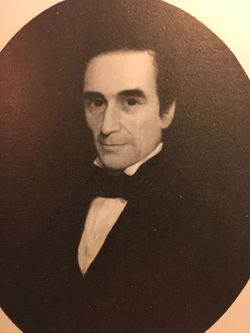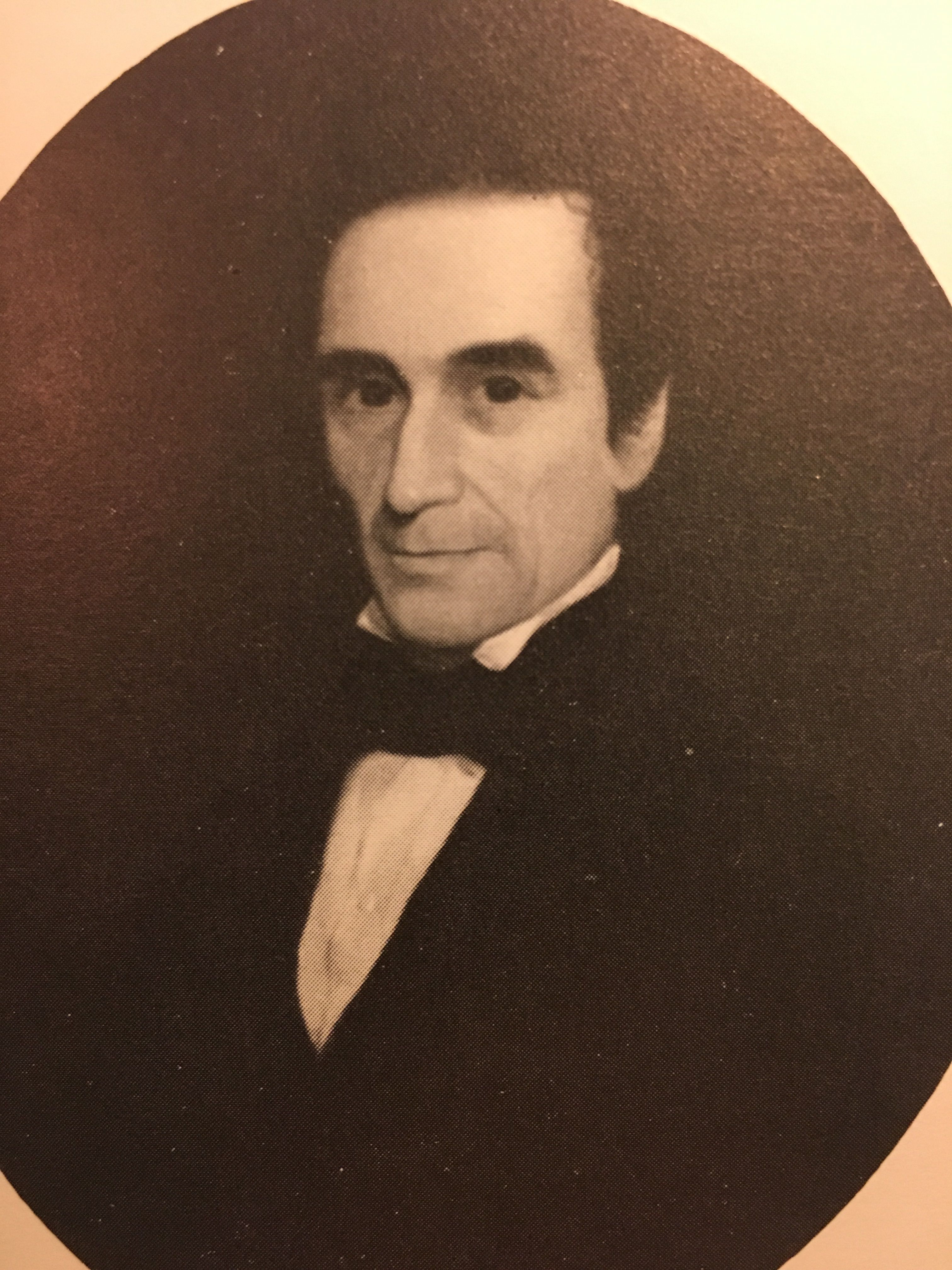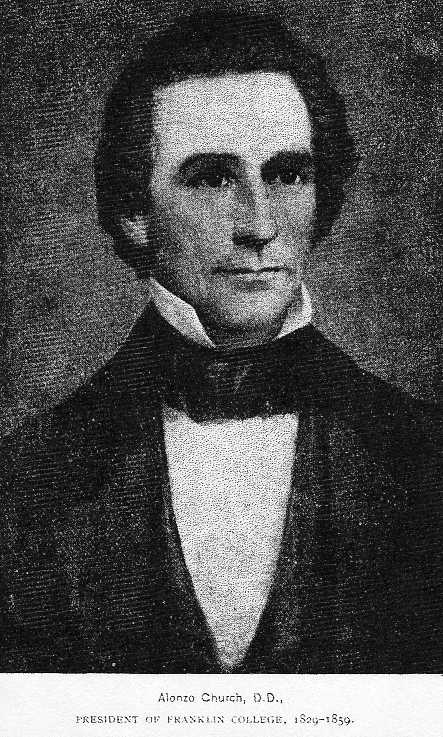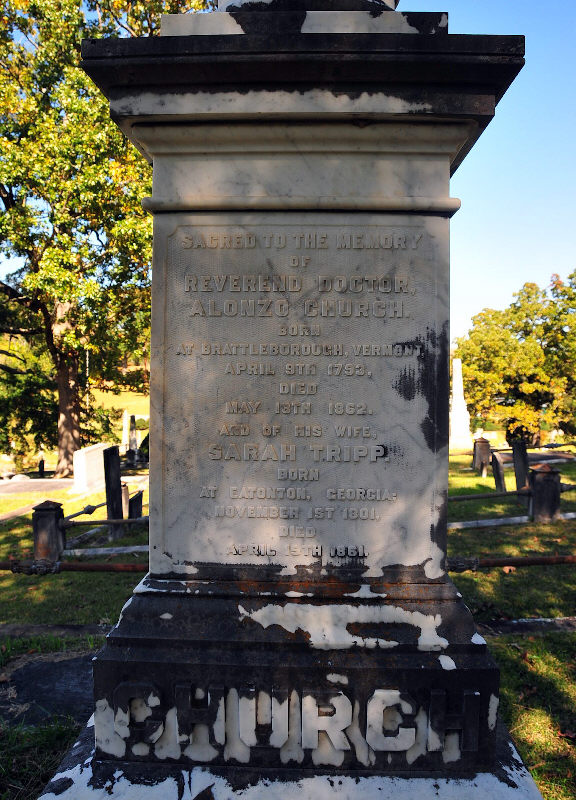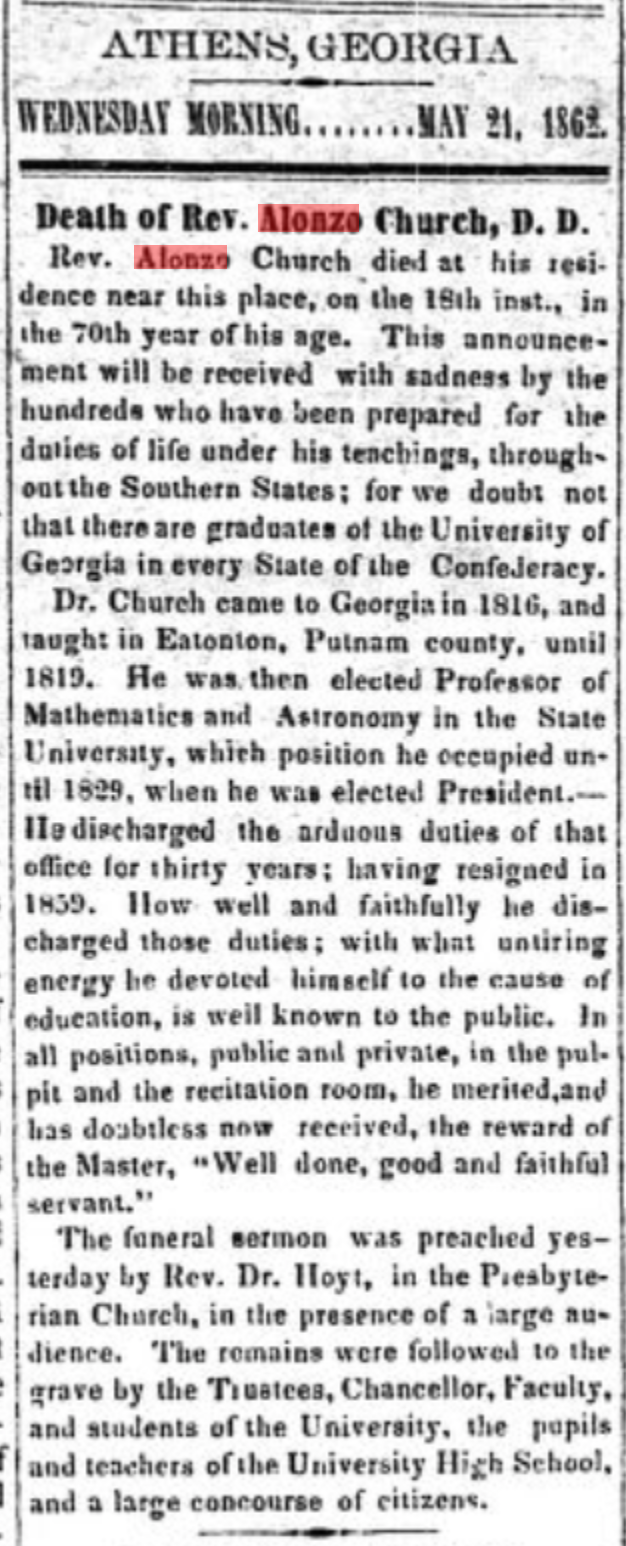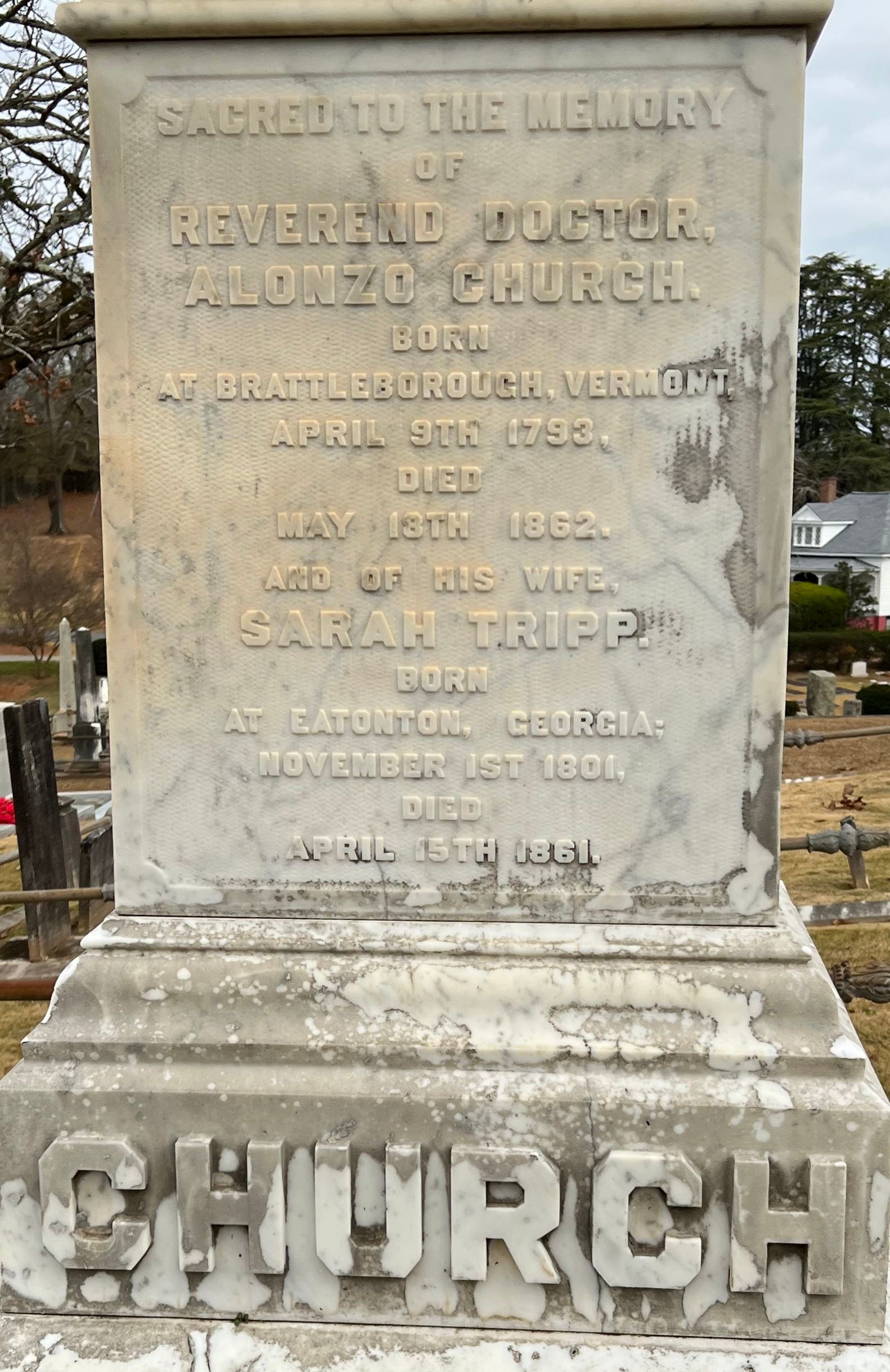**********************
Found in the Annals of Brattleboro, VT - page 70 & 71
REV. ALONZO CHURCH, D. D.,
was born in the town of West Brattleboro, April 9, 1793. He was son of one and grandson of another, who, in the war of the Revolution, had done the State service. His boyhood and youth were spent upon a small farm, which his father had settled at the close of the war, and where he learned those lessons of self denial and acquired that stern integrity which served in after life to render him eminently useful. His active mind could not long brook the monotony of a farmer's life; at an early age he entered Middlebury college, supporting himself during his college course by teaching in the winter. He graduated in the class of ——— and soon after receiving his degree his health failing, he emigrated to Georgia.
A stranger in a distant state, the singular purity of his life and his earnest devotion to his chosen profession, soon gained for him the esteem and affection of those among whom he had cast his lot.
The classical school which, as early as 1818, he established in Putnam, soon became famous, and pupils were attached to it from all the adjoining counties of the State. His fame as a teacher was established on a firm basis before he had reached mature manhood. In a country which at the time was the outpost of civilization, unaided and alone, he built up and maintained a school of which older states might have been proud; began that labor in the cause of education, which ended only with his long life.
Married at an early age to a fair pupil — both sexes were under his tuition — he identified himself at once with the people of his adopted State
Sincerely pious from his boyhood, he allied himself with the Presbyterian church, and soon after his arrival in Georgia was ordained a minister of that denomination. Deriving from his profession an income sufficient for his modestwants, he devoted himself to the ministry without salary, supplying the pulpit of those poor churches whose members were unable to provide themselves with a pastor. His labors as a preacher were not less earnest than as a teacher, and his success was best attested by the devotion shown him by his humble congregation.
He did not, however, remain long in a subordinate position. His talents and zeal and the skill and prudence he manifested in teaching and in the control and management of youth, soon made him widely known, and in the year 1819, he was elected professor of mathematics and astronomy in Franklin college. an institution which had been endowed by the State of Georgia as early as 1789. This necessitated a change of residence — the last he ever made. For more than forty years he lived in the town of Athens, among the foothills of the Alleghanies, and there heside the Oconee sleeps his last sleep.
For ten years the young professor filled his post so acceptably that at the expiration of that time, upon the resignation of Dr. Waddell, the president of the college, he was unanimously chosen his successor, which position he filled for thirty years, and finally, when broken by the long labor of life, he resigned to other hands his post of honor and of toil.
The regret and affection of all went with the faithful teacher to the modest home which he had prepared for his old age, near the town which had so long known him as its ablest, purest and most influential citizen, and his best eulogy is to be found in the devotion which even now his former pupils show for the memory of their teacher.
Among those who received at his hands instruction are many of Georgia's most distinguished sons. Two of' his pupils are now United States Senators. A. H. Stevens was among his scholars, and during his collegiate career was an inmate of his family. Numbers of Georgia's best and oldest men have acknowledged their indebtedness to the wise and good man who directed their education. He was the friend and associate of Crawford and Bowen, of Calhoun and Preston and McDuffie, and, although his pursuits were different. he was a peer among them.
The fitness of the man for an instructor
BRATTLEBORO. 71
of the young was acknowledged by all who knew him. While courteous and kind to such a degree as justly to entitle him to the appellation given him, "the Chesterfield of Georgia," upon occasion he could be firm and decided.
His sense of justice was so strong that he was never accused of partial or prejudiced action.
In his intercourse with others he was ever kind, while his charity covered the follies of youth with its mantle; and, best of all, he was imbued with the spirit of a pure, earnest and consistent Christian. With an intuitive knowledge of his peculiar fitness for the work, he adopted teaching as his profession, and for more than forty years he devoted his life and energies to that pursuit.
He loved with the attachments and strength of his manhood the home and state of his adoption, but never ceased to remember the land of his nativity. In the sunny clime which he chose for his life-long home, his heart turned often to the green hills among which his boyhood was spent, and the friends of his youth were never forgotten.
His Alma Mater conferred upon him the degree of Doctor of Divinity, and, though there may on its alumni be names more widely known to fame, there is not one whose life has reflected more honor upon her teaching.
To him Georgia owes a debt of gratitude. To him more than to any other is due the intellectual developement of her citizens and the silent influence of his teaching.
Dr. Church died May 18, 1862, aged 69.
Vermont may proudly claim him as one of her purest and noblest sons.
[Furnished by a Descendent, Wm. Henry Wells, of N. Y. ]
**********************
Found in the Annals of Brattleboro, VT - page 70 & 71
REV. ALONZO CHURCH, D. D.,
was born in the town of West Brattleboro, April 9, 1793. He was son of one and grandson of another, who, in the war of the Revolution, had done the State service. His boyhood and youth were spent upon a small farm, which his father had settled at the close of the war, and where he learned those lessons of self denial and acquired that stern integrity which served in after life to render him eminently useful. His active mind could not long brook the monotony of a farmer's life; at an early age he entered Middlebury college, supporting himself during his college course by teaching in the winter. He graduated in the class of ——— and soon after receiving his degree his health failing, he emigrated to Georgia.
A stranger in a distant state, the singular purity of his life and his earnest devotion to his chosen profession, soon gained for him the esteem and affection of those among whom he had cast his lot.
The classical school which, as early as 1818, he established in Putnam, soon became famous, and pupils were attached to it from all the adjoining counties of the State. His fame as a teacher was established on a firm basis before he had reached mature manhood. In a country which at the time was the outpost of civilization, unaided and alone, he built up and maintained a school of which older states might have been proud; began that labor in the cause of education, which ended only with his long life.
Married at an early age to a fair pupil — both sexes were under his tuition — he identified himself at once with the people of his adopted State
Sincerely pious from his boyhood, he allied himself with the Presbyterian church, and soon after his arrival in Georgia was ordained a minister of that denomination. Deriving from his profession an income sufficient for his modestwants, he devoted himself to the ministry without salary, supplying the pulpit of those poor churches whose members were unable to provide themselves with a pastor. His labors as a preacher were not less earnest than as a teacher, and his success was best attested by the devotion shown him by his humble congregation.
He did not, however, remain long in a subordinate position. His talents and zeal and the skill and prudence he manifested in teaching and in the control and management of youth, soon made him widely known, and in the year 1819, he was elected professor of mathematics and astronomy in Franklin college. an institution which had been endowed by the State of Georgia as early as 1789. This necessitated a change of residence — the last he ever made. For more than forty years he lived in the town of Athens, among the foothills of the Alleghanies, and there heside the Oconee sleeps his last sleep.
For ten years the young professor filled his post so acceptably that at the expiration of that time, upon the resignation of Dr. Waddell, the president of the college, he was unanimously chosen his successor, which position he filled for thirty years, and finally, when broken by the long labor of life, he resigned to other hands his post of honor and of toil.
The regret and affection of all went with the faithful teacher to the modest home which he had prepared for his old age, near the town which had so long known him as its ablest, purest and most influential citizen, and his best eulogy is to be found in the devotion which even now his former pupils show for the memory of their teacher.
Among those who received at his hands instruction are many of Georgia's most distinguished sons. Two of' his pupils are now United States Senators. A. H. Stevens was among his scholars, and during his collegiate career was an inmate of his family. Numbers of Georgia's best and oldest men have acknowledged their indebtedness to the wise and good man who directed their education. He was the friend and associate of Crawford and Bowen, of Calhoun and Preston and McDuffie, and, although his pursuits were different. he was a peer among them.
The fitness of the man for an instructor
BRATTLEBORO. 71
of the young was acknowledged by all who knew him. While courteous and kind to such a degree as justly to entitle him to the appellation given him, "the Chesterfield of Georgia," upon occasion he could be firm and decided.
His sense of justice was so strong that he was never accused of partial or prejudiced action.
In his intercourse with others he was ever kind, while his charity covered the follies of youth with its mantle; and, best of all, he was imbued with the spirit of a pure, earnest and consistent Christian. With an intuitive knowledge of his peculiar fitness for the work, he adopted teaching as his profession, and for more than forty years he devoted his life and energies to that pursuit.
He loved with the attachments and strength of his manhood the home and state of his adoption, but never ceased to remember the land of his nativity. In the sunny clime which he chose for his life-long home, his heart turned often to the green hills among which his boyhood was spent, and the friends of his youth were never forgotten.
His Alma Mater conferred upon him the degree of Doctor of Divinity, and, though there may on its alumni be names more widely known to fame, there is not one whose life has reflected more honor upon her teaching.
To him Georgia owes a debt of gratitude. To him more than to any other is due the intellectual developement of her citizens and the silent influence of his teaching.
Dr. Church died May 18, 1862, aged 69.
Vermont may proudly claim him as one of her purest and noblest sons.
[Furnished by a Descendent, Wm. Henry Wells, of N. Y. ]
Family Members
-
![]()
Elvira Anne Church Lee
1818–1881
-
![]()
Sarah J. Church Whitner
1820–1890
-
![]()
Elizabeth Whipple Hunt Church Robb
1823–1868
-
![]()
Julia Maria Church Croom
1824–1888
-
Cornelia W. Church
1826–1830
-
Mary A. J. Church
1828–1828
-
![]()
Alonzo W Church
1829–1909
-
![]()
Col John Reuben Church
1832–1863
-
Mary A. Church
1833–1833
-
Henry F. Church
1835–1836
-
![]()
Anna Pleasant Church Whitner
1837–1876
-
![]()
CPT William Lee Church
1843–1871
Advertisement
Explore more
Sponsored by Ancestry
Advertisement
